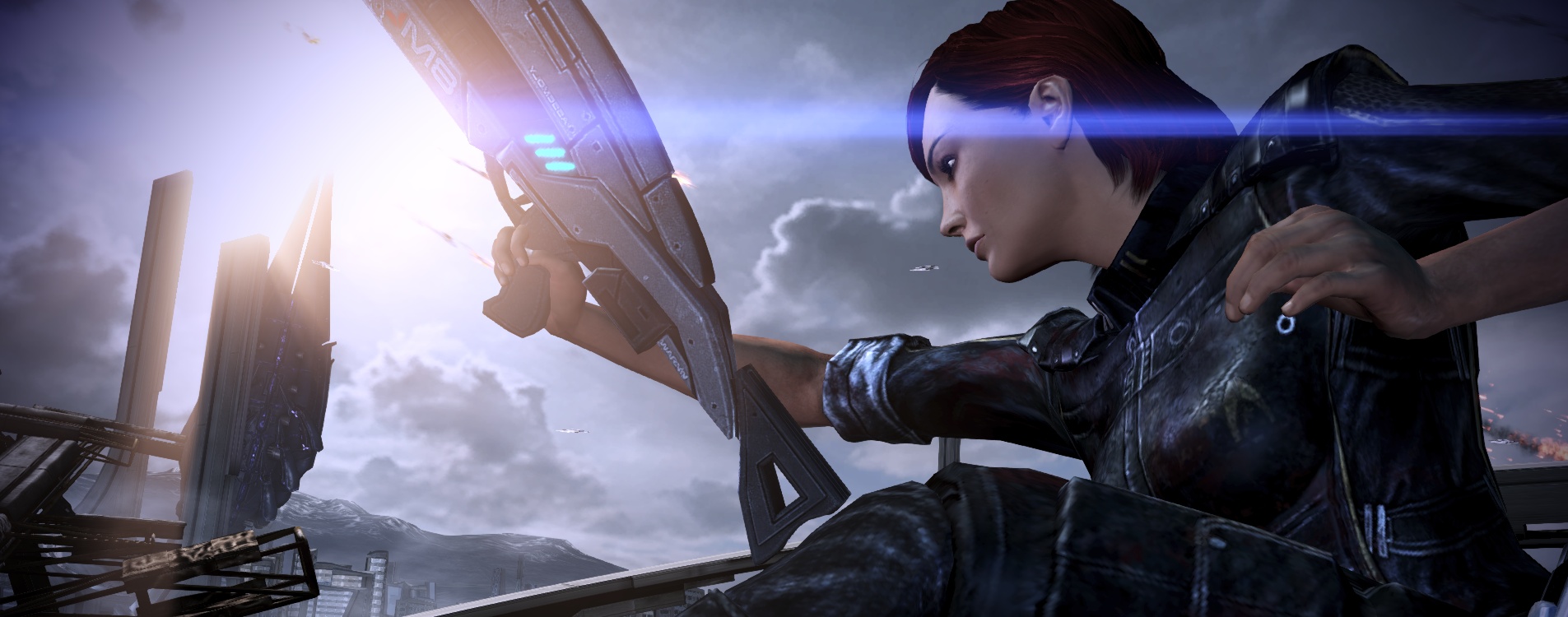Our Verdict
A culmination of all the choice, character and intrigue of Mass Effect. A satisfying end to a spectacular adventure.
PC Gamer's got your back
Mass Effect was a space RPG about killing a flying robot god - a Reaper. Mass Effect 2 was about stopping one from being built. In Mass Effect 3, they've warped in from darkspace in their hundreds.
And that's all I'll say about the plot. This review will be spoiler-free even for those of you who've avoided the trailers and the demo.
In all three games, your time is split evenly between persuading people to help you and shooting people who won't. The original's strength was its main quest: a chase that felt both personally motivated and galactically important. Mass Effect 2's plot was muddled and brief, but livened up by an exotic cast of new characters with interesting side stories.
Mass Effect 3 tries for the best of both worlds: an urgent and galaxy-critical plot that directly involves the entire crowd of oddball personalities the series has built up. And it works.
Inside of 20 minutes, you have a crucial goal and a clear route to achieving it. And unlike the previous games, every sidequest and adventure along the way is connected to that. The war gives everyone a reason to need your help, and everyone you help has reason to join the war.
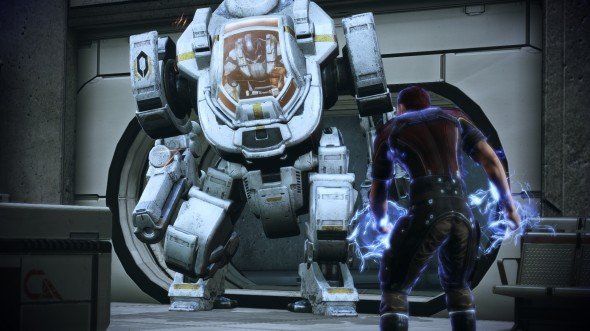
That brings you into contact with just about every familiar face from the previous games, each of whom gets at least one fan-pleasing moment of bravado or violence. But the most remarkable thing about them is what makes Mass Effect 3 unique: they could all be dead.
By the end of Mass Effect 2, only one of your 13 former squadmates is certain to be alive. Those who are each play a leading role in a subplot of Mass Effect 3. Those who aren't have their stories invisibly trimmed out or rewritten with new characters.
These newbies are not just bland stand-ins, either. In some cases, a friend's absence is filled by someone with a radically different motivation, and new relationships with the rest of the cast. A Turian squadmate summed up his feelings for one of these replacement characters mid fight:
"I don't like him!"
It's an extraordinarily complex, reactive and futuristic bit of storytelling, and it makes Mass Effect 3 personal and unique for anyone who has a history with the series. If you're starting fresh, the game assumes the death of a few characters whose stories make less sense to new players, and leaves the rest alive.
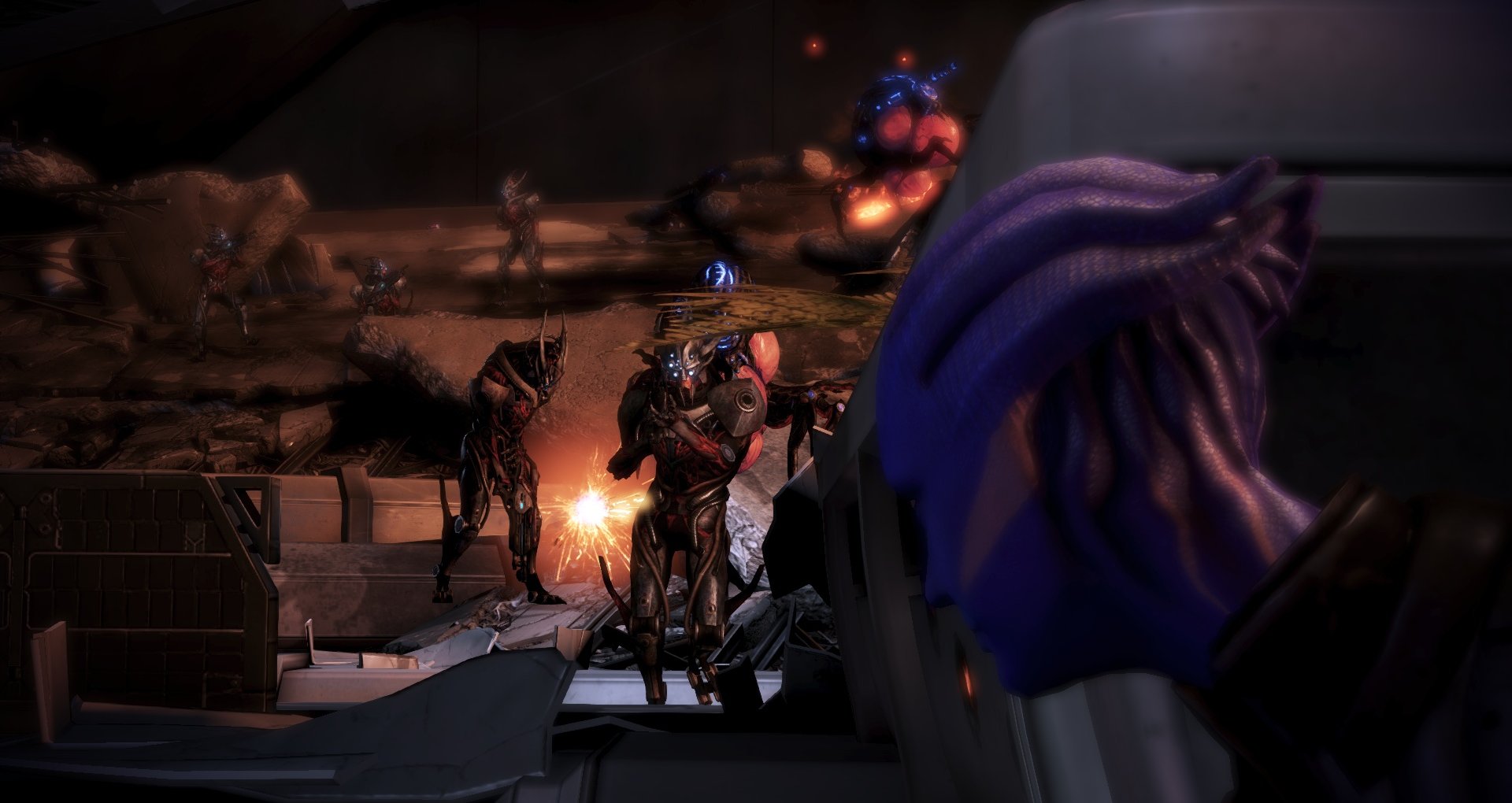
Other than the colourful, beautifully designed characters, one of the main treats of a Mass Effect game is the colourful, beautifully designed planets. The large-scale problems you're facing in this third outing make your mission a whistle-stop tour of the key races' home worlds, their glowing sci-fi dreamscapes in the process of being stomped on by mountain-sized robot lobsters. It's spectacular, and it feels like exploring the heart of the gorgeous galaxy you've been skirting all this time.
Each away-mission to these places is a substantial, satisfying fight against one of several different factions. The combat feels another notch more impactful than that of Mass Effect 2. The classes are stronger and more distinct: the Infiltrator bursts heads with every sniper rifle shot, the Vanguard can slam herself into enemies over almost any distance or obstacle, and the Adept flings crowds of enemies into the air and rips them apart with biotic combos.
You fine-tune these powers as you level up, deciding between, say, a longer cloak duration or the ability to use one power without revealing yourself. And the weapons you find and buy give you interestingly different compromises between fire rate and stopping force - tweaked further with mods.
But the most radical and effective change to the RPG side of combat is the ability to choose your own balance between weapons and abilities. Any class can now take one of each weapon type into a fight, but the more you carry, the slower your powers recharge.
I gave my Infiltrator a heavy shotgun, meaning she could use Cloak less often but deal a chunkier slam of damage when she struck. Trying an Adept, I shelved everything but a featherweight sub-machinegun, letting her wub out Singularities and Warp Fields every second. It finally feels like the class system has lost the last of its arbitrary restrictions, and you can create your own play style.
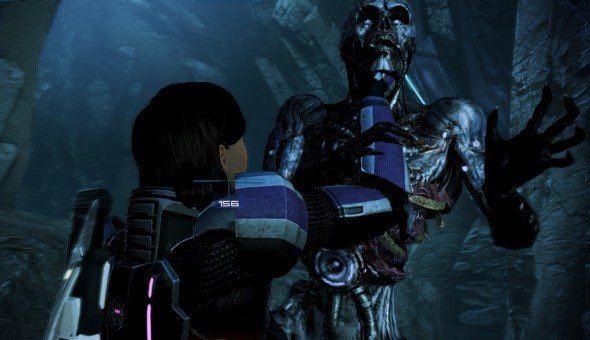
It all mixes well with your squadmate's powers. I liked to stealth behind enemy lines, hack their turrets, then let my biotic friend lift people out of cover to float them into range of their own subverted weapon. Once, a lifted soldier was pelted over to us by his own turret's fire, and my Cryo ammo power caused one of our shots to freeze him solid. He dropped to the ground and shattered. I felt like applauding.
The fights have also become more complex and less repetitive, thanks to a lot of smart interplay between enemy types. Some give each other armour or shielding, or feed on each other's corpses, or burst out of each other when you shoot the wrong sac. Huge, fast, melee-only Brutes force an alarming change of pace from cautious cover shooting. And the Banshee, a tall, spindly horror that teleports towards you as it shakes with rage, is properly traumatic to fight.
The best way to deal with all of this varies with the arena it's found in - something Mass Effect 2 never managed. It's the difference between dreading the next prolonged combat sequence and relishing it.
The low points of the combat are the bigger boss fights, which too often involve one- or two-shot kills that hit you almost instantly and seemingly at random. If you have no pride, and lord knows I don't, you can always jam the difficulty level down to its new 'Narrative' mode for a moment: it's designed for non-gamers who just want the story, so it makes you virtually invincible.
The only unfixable problem, boss-wise, is a recurring character who's scripted to survive and escape your first few encounters. It's always painful to watch someone fail to shoot the bad guy in a cutscene. When it's my Shepard, a character I love for prematurely ending conversations with a bullet, it's downright agony.
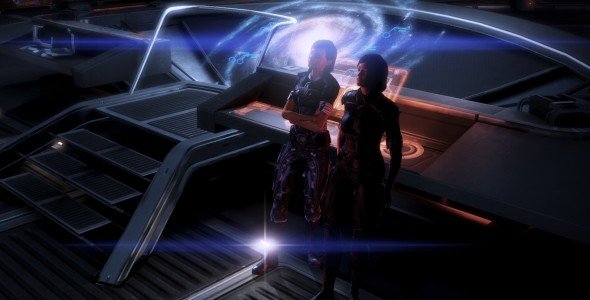
I'll get the other irritations over with now. The spacebar - previously only used for sprinting, ducking, taking cover, using switches, talking to people and vaulting over things - is now also used for diving away from cover too. It makes an already maddeningly imprecise system utterly ridiculous. At least half my deaths were from the spacebar not doing what I expected it to.
We're on PCs. We have 128 keys. We can handle a separate button for taking cover.
The multiplayer is a cooperative survival mode - you and your friends pick a class and fight off waves of enemies. It's not switched on at the time of writing, so I can't tell you how that plays beyond what you can try for yourself in the demo. But the way it affects the main game is needlessly problematic.
In singleplayer, everything you do accumulates 'war assets'. When you finish the game, how many of these you have determines how good an ending you get: how well the final fight goes for your side. Success in co-op multiplies your war assets, up to twice their normal value. That means that if you only play singleplayer, or want to finish singleplayer first, you'll have to grind the living hell out of its most tedious fetch quests to get the best ending.
These quests generally involve scouring the galaxy for a planet someone mentioned, scanning it, then returning to the Citadel. I did every proper quest I could find, but didn't play multiplayer and skipped most of these empty FedEx ones. The ending I got... I won't say how, but it could have gone a lot better.
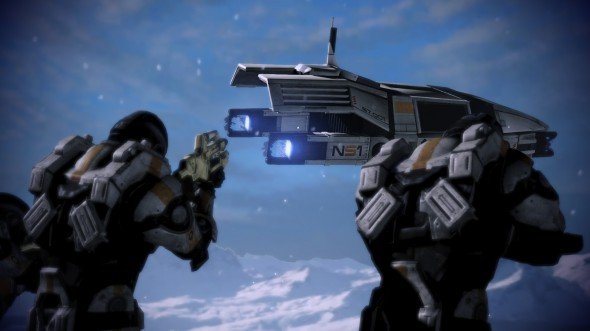
In general, too, the end of the series is a mixed bag. Satisfying in some ways, nonsensical in others, and ultimately too simple. But the sheer scale of the adventure it's ending - and the music, which is gorgeous throughout - gives it an emotional impact that goes beyond its plot payload.
It left me feeling incredibly sad.
Shepard is the best game character I've ever played. She's been an ongoing improv collaboration between me and BioWare to build a hero that works for their plot, but suits my tastes. Since we composed her first inspiring speech to the crew when she took charge of the Normandy, a commanding, brutally effective woman has emerged through 60 hours of tough decisions. She's killed thousands who got in her way, hung up on the interstellar Council four times, punched the same reporter in three different interviews and shot people mid-sentence. But she has also formed conflicted, quiet, sometimes touching relationships with some of the alien weirdos dragged along on her mission. Relationships that gave her character a gentler side I didn't expect, but which made sense of the person I had in my head.
I'm thinking back through all that as the credits roll. At the end of them a box pops up. It says: "you can continue to build Shepard's legend through further gameplay and downloadable content" then reloads my last save.
So now I'm laughing instead.
A culmination of all the choice, character and intrigue of Mass Effect. A satisfying end to a spectacular adventure.
